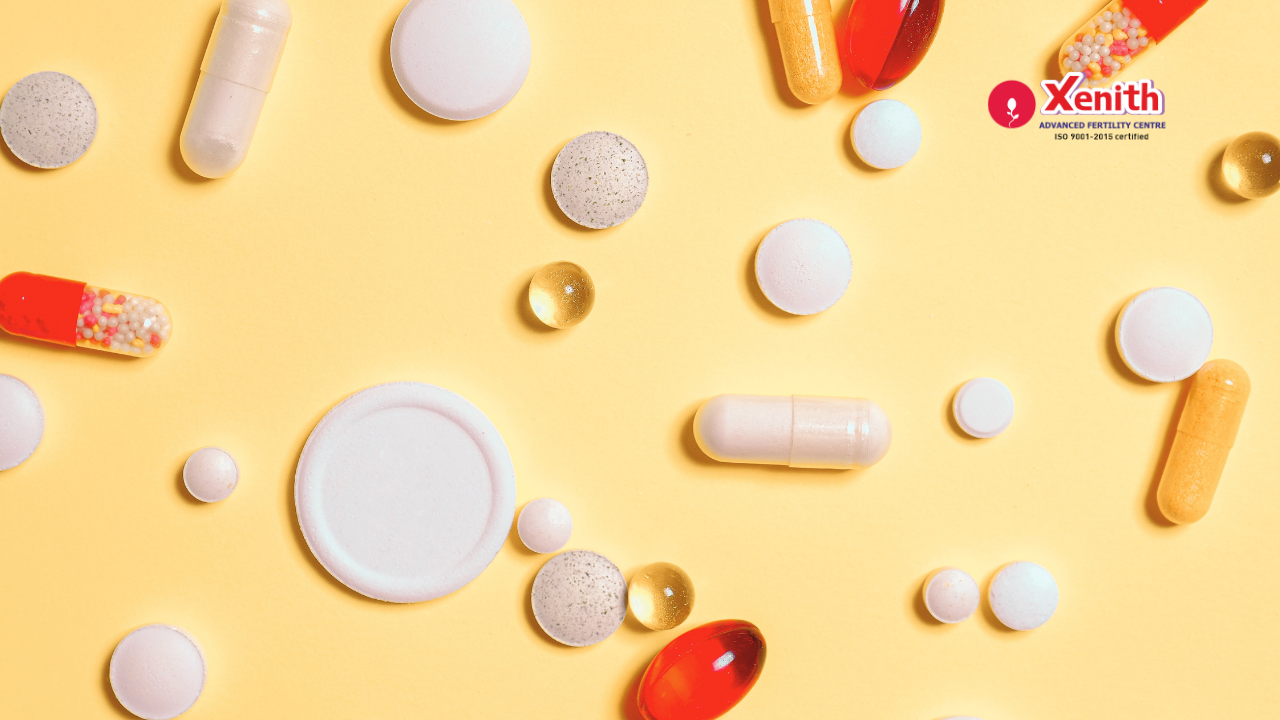Everyone knows about the importance of nutrition during pregnancy. But a healthy diet can also be beneficial for conception. Even if we eat the healthiest of meals, our food will likely fall short of several crucial vitamins that are important for the various stages of conception all the way through to pregnancy and giving birth. The role of vitamins and fertility is complicated to understand because each person’s body is unique and may require different needs.
What are vitamins and fertility supplements?

Free Thursday Consultation
Book Your AppointmentVitamins are organic substances needed in small amounts by the body for normal growth and metabolism. Multivitamins may contain several vitamins along with supplements of minerals, herbs, amino acids, and fatty acids depending on their purpose.
Fertility supplements contain micronutrients which include vitamins, minerals, and other micronutrients that the body needs in small amounts that may help people increase their chances of pregnancy. Fertility supplements like nutritional supplements are not regulated and that means no one is keeping track of the content in those supplements and there might not be much scientific research or factual evidence backing their claim.
Prenatal vitamins are taken during pregnancy to support the growth and development of the fetus and the mom. They don’t necessarily improve fertility but they are recommended for IVF patients because it’s best to start them about 3 months prior to pregnancy. Women who have found it hard to conceive are reported to have lower than recommended levels of certain micronutrients. Taking a prenatal vitamin at least one month before conception helps because it may take time for the vitamins and minerals to get to optimal levels in your body. Make sure the purchased vitamins are from a reputed pharma company.
The most effective way to support fertility is to accurately analyze which nutrients you are deficient in and optimize those levels specifically for you. It is best to consult with your doctor before taking any vitamins or supplements for your own safety to avoid any adverse reactions with other medications you might be taking and get their advice.
List of vitamins and minerals that may aid in female fertility
1) Folic acid, also called vitamin B9 is needed for the development of red blood cells and DNA production. Folate is the natural form of the B9 vitamin in food and folic acid is the synthetic form. It also plays an important role in cell division. Studies found adequate folate levels are important for oocyte quality, maturation, fertilization, and implantation. Females who consume folic acid had fewer issues with ovulation, conceive faster, and may increase the chances of live birth when using assisted reproductive technology.1,2,3 Take it at least a month before conception to support fetal neural tube(brain and spine) development. For women trying to conceive, the recommended intake is 400 micrograms daily.
2) Vitamin B12, also known as cobalamin helps in the proper functioning of the brain and nervous system and for forming red blood cells and producing the genetic components DNA and RNA of the egg as well as the sperm. Deficiency can lead to anemia, infertility, higher chances of fetal loss and could possibly contribute to abnormal ovulation, disruption in cell division, impaired development of egg, and implantation issues. The recommended dosage is 2.4 micrograms daily.
3) Omega 3 fatty acids are found in fish, vegetable oils, nuts, and leafy vegetables. Fish oil-omega3 fatty acids have been shown to improve female fertility, and egg quality. They are an important part of cell membranes and for preventing heart disease. In one study, women taking omega 3 supplements were 1.5 more likely to conceive compared with those not taking omega 3 supplements.4 However other studies have found no change in fertility. So more research needs to be carried out. Consider taking 1000mg of omega 3 fatty acids daily.
4) Coenzyme Q10 is an antioxidant and was found to increase fertility, especially for women over 40. It optimizes egg quality, thickens uterine lining, and improved fertility rates for women with PCOS. It plays important role in energy production inside cells. Its levels decline with age and this is thought to contribute to poorer egg quality. A study of infertile women undergoing ART indicates that CoQ10 supplementation increases clinical pregnancy rates. However, more studies need to be done to prove this theory.5
5) Vitamin D is also called the sunshine vitamin. Its role is to keep bones healthy and strong by helping the body absorb calcium. Vitamin D deficiency has been found to lead to reduced fertility and higher Vitamin D levels were associated with IVF success. However, more research needs to be done to confirm these findings.6 Vitamins and micronutrients have a positive impact on fertility. Many supplements claim they promote natural fertility, improve ovulatory performance or improve your pregnancy chances. But that evidence might not exist and can bring a false sense of hope. So, before you take any supplements or vitamins, consult with your doctor about their implications on your fertility and health. The fertility specialists in Pune at Xenith Advanced Fertility Centre are more than willing to answer any questions you might have about vitamin supplementation for fertility. Xenith is the best fertility clinic in Pune with a high success rate for couples who have been trying to have a baby but have not succeeded.




